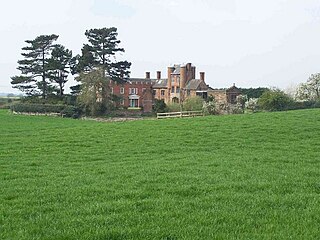Related Research Articles

The Long Parliament was an English Parliament which lasted from 1640 until 1660. It followed the fiasco of the Short Parliament, which had convened for only three weeks during the spring of 1640 after an 11-year parliamentary absence. In September 1640, King Charles I issued writs summoning a parliament to convene on 3 November 1640. He intended it to pass financial bills, a step made necessary by the costs of the Bishops' Wars against Scotland. The Long Parliament received its name from the fact that, by Act of Parliament, it stipulated it could be dissolved only with agreement of the members; and those members did not agree to its dissolution until 16 March 1660, after the English Civil War and near the close of the Interregnum.

Nathaniel Fiennes, c. 1608 to 16 December 1669, was a younger son of the Puritan nobleman and politician, William Fiennes, 1st Viscount Saye and Sele. He sat in the House of Commons at various times between 1640 and 1659, and served with the Parliamentarian army in the First English Civil War. In 1643, he was dismissed from the army for alleged incompetence after surrendering Bristol and sentenced to death before being pardoned. Exonerated in 1645, he actively supported Oliver Cromwell during The Protectorate, being Lord Keeper of the Great Seal from 1655 to 1659.
Henry Grey, 10th Earl of Kent, known as Lord Ruthin from 1639 to 1643, was an English politician who sat in the House of Commons in 1640 and succeeded to the title Earl of Kent in 1643.

The Adventurers' Act 1640 was an Act of the Parliament of England which specified its aim as "the speedy and effectual reducing of the rebels in His Majesty's Kingdom of Ireland".

Sir Edward Littleton, 1st Baronet was a 17th-century English Baronet and politician from the extended Littleton/Lyttelton family, the first of a line of four Littleton baronets with Pillaton Hall as their seat. He initially joined the Parliamentarians during the English Civil War. Having tried unsuccessfully to find a third way, he switched his support to the Royalist cause – a decision that led to his financial ruin, as large debts made it impossible to redeem his estates from sequestration after the victory of Parliament.

Sir Edward Hungerford (1596–1648) of Corsham, Wiltshire and of Farleigh Castle in Wiltshire, Member of Parliament, was a Parliamentarian commander during the English Civil War. He occupied and plundered Salisbury in 1643, and took Wardour and Farleigh castles.

John St Aubyn (1613–1684) was an English politician who sat in the House of Commons of England in 1640. He served as a colonel in the parliamentary army in the English Civil War.
Nathaniel Hallowes (1582–1661) of Dethick, Derbyshire was an English politician who sat in the House of Commons of England from 1640 to 1653 and again in 1659. He was an active Parliamentarian during the English Civil War.
Simon Snow was an English politician who sat in the House of Commons of England from 1640 to 1648. He supported the Parliamentarian side during the English Civil War
Squire Bence was an English merchant, seafarer and politician who sat in the House of Commons of England from 1640 to 1648.
Sir Philip Musgrave, 2nd Baronet was an English politician who sat in the House of Commons of England from 1640 to 1643 and from 1661 to 1678. He served in the Royalist army in the Civil War.
Alexander Bence was an English merchant and politician who sat in the House of Commons of England from 1640 to 1648 and in 1654. He supported the Parliamentarian side in the English Civil War.
Sir Neville Poole was an English politician who sat in the House of Commons variously between 1614 and 1648. He supported the Parliamentarian side in the English Civil War.
Sir John Evelyn was an English politician who sat in the House of Commons variously between 1626 and 1660.
Robert Nicholas (1595–1667) was a judge and an English Member of Parliament who supported the Parliamentary cause in the English Civil War.
Sir Thomas Soame was an English politician who sat in the House of Commons from 1640 to 1648.
John Penrose was an English politician who sat in the House of Commons from 1646 to 1648.
Sir John Leigh (1598–1666) was an English politician who sat in the House of Commons at various times between 1640 and 1660.

Henry Henley (1612–1696) was an English politician who sat in the House of Commons at various times between 1653 and 1681. He supported the Parliamentary cause in the English Civil War.
References
- ↑ Nigel Yates Traffic and politics: the construction and management of Rochester Bridge
- ↑ Willis, Browne (1750). Notitia Parliamentaria, Part II: A Series or Lists of the Representatives in the several Parliaments held from the Reformation 1541, to the Restoration 1660 ... London. pp. 229–239.
- ↑ 'May 1643: An Ordinance for the speedy raising and levying of money thorowout the whole Kingdome of England, and dominion of Wales for the relief of the Common-wealth, by taxing such as have not at all contributed or lent, or not according to their Estates and Abilities.', Acts and Ordinances of the Interregnum, 1642-1660 (1911), pp. 145-155. Date accessed: 12 November 2010